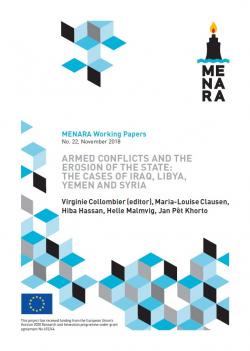Armed Conflicts and the Erosion of the State: The Cases of Iraq, Libya, Yemen and Syria
How have armed conflicts in Iraq, Syria, Libya and Yemen challenged or weakened each state? This report underlines the main dynamics that have affected state capacity and authority and highlights the key challenges facing policymakers in rebuilding centralized, efficient and legitimate states. It puts particular emphasis on the need for building consensus around governance mechanisms that can reconnect local- and national-level institutions and manage resource distribution. It also underlines the need for a holistic approach towards rebuilding efficient and legitimate security structures, taking into account that any such efforts will be political and contentious.
-
Details
Rome, IAI, November 2018, 26 p. -
In:
-
Issue
Working Papers 22
Introduction
1. The Challenge of Rebuilding Centralized States
1.1 Privileging Libya’s National or Local Institutions?
1.2 One Syrian Territory, Many Syrian “States”
1.2.1 The Regime’s Strategy for State Survival: Patronage Networks and Security Outsourcing
1.2.2 The Opposition’s Failed Efforts to Build a Different Syrian State
1.2.3 The Kurdish Democratic Self-Administration: A Quasi-State, but for How Long?
1.3 Yemen’s Unity Imperilled?
1.4 Iraq’s Political System: A Major Threat to the State
2. The Challenge of Rebuilding Security Institutions that Can Serve the State
2.1 The Sensitivity of Iraq’s Security Sector Reform
2.2 The Influence of Hybrid Armed Actors on Libya’s Divided Political Institutions
2.3 The Syrian Regime’s Tactics of Outsourcing and Sharing Security Functions
Conclusion
References



